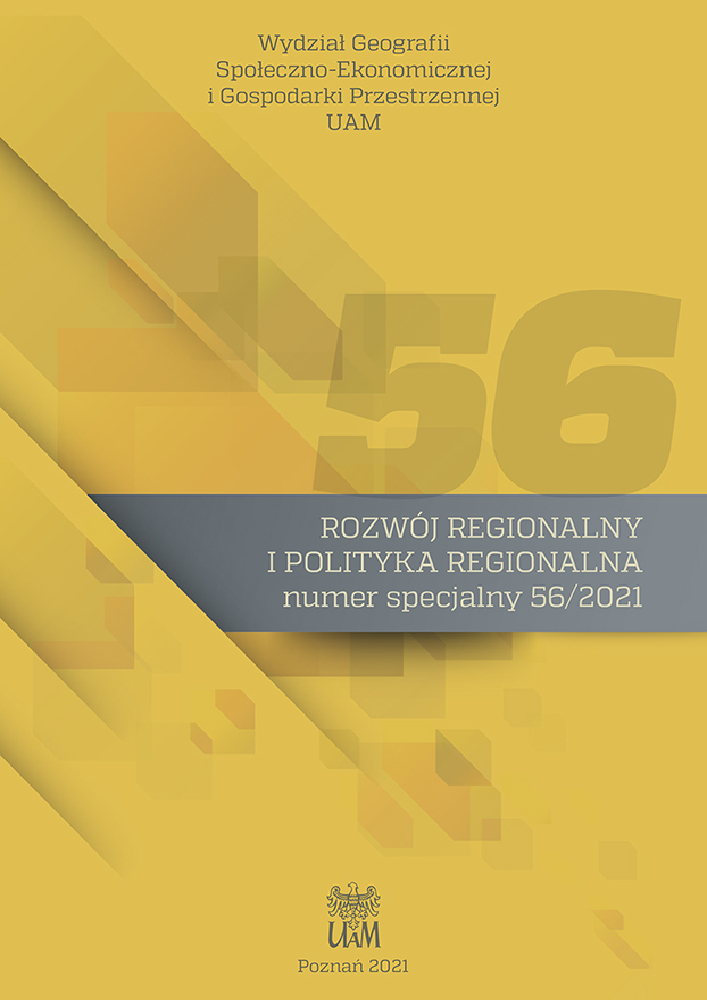Abstract
The text provides a voice in discussing the shared paradigmatic space of social geography and urban sociology about ‘place’. The study’s theses contrast two ways of understanding the relationship between disciplines: “making common” and “sharing”, pointing to the former’s importance concerning the sociological research tradition of the Chicago School of the 1920s and 1930s. The positions and empirical practices produced at that time were perfectly in line with the discussion that accompanied the independence of social geography, which was also one of the highly influential urban sociology trends. The text analytically explores three studies on the Chicago School that have appeared since the second half of the 1990s. A separate theme is understanding the empirical paradigm and the understanding of mixed methods as an example of “making common” research practices based on the concept of the empirical paradigm. The study’s conclusions aim to propose a mixed method convention for interdisciplinary studies of urban sociology and social geography, whose inspiration lies in the American tradition of Urban sociology.
References
Abbott A. 1997. Of Time and Space: The Contemporary Relevance of the Chicago School. Social Forces, 75, 4 (Jun., 1997): 1149–1182.
Abbott A. 1999. Department and Discipline. Chicago Sociology at One Hundred. Castells M. 1977. The Urban Question: A Marxist Approach. Edward Arnold, London.
Chojnicki Z. 2010. Koncepcje i studia metodologiczne i teoretyczne w geografii. Bogucki Wydawnictwo Naukowe, Poznań.
Denscombe M. 2008. Communities of Practice A Research Paradigm for the Mixed Methods Appro ach. Journal of Mixed Methods Research, 2, 3: 10.1177/1558689808316807.
Gieryn T.F. 2000. A Space for Place in Sociology. Annual Review of Sociology, 26: 463–496 (https://doi.org/10.1146/annurev.soc.26.1.463).
Harvey D. 1984. On The History And Present Condition Of Geography: An Historical Materialist Manifesto. The Professional Geographer, 36, 1: 1–11. DOI: 10.1111/j.0033-0124.1984.00001.x.
Jackson P. 1986. Social Geography: The Rediscovery of Place. Progress in Human Geography, 10(1): 118–124. DOI: 10.1177/030913258601000107.
Kuhn T. 1970. The Structure of Scientific Revolutions. Second Ed. The University of Chicago. Lisiecki S. 2015. Florian Znaniecki i Janusz Ziółkowski o tradycji i kontynuacjach badań nad wartościowaniem przestrzeni miast. Ruch Prawniczy, Ekonomiczny i Socjologiczny, 1: 13–26.
Lisowski A. 2012. O miejscu geografii społeczno-ekonomicznej w geografii i systemie nauki. Przegląd Geograficzny, 84, 2: 171–198 (http://dx.doi.org/10.7163/PrzG.2012.2.1).
Masterman M. 1970. The Nature of a Paradigm. [W:] I. Lakatos, A. Musgrave (red.), Criticism and the Growth of Knowledge. Cambridge University Press, Cambridge, s. 59–89.
Merriman B. 2015. Three Conceptions of Spatial Locality in Chicago School Sociology (and Their Significance Today). American Sociologist, 46: 269–287. DOI 10.1007/s12108-014-9239-4.
Orman T.F. 2016. „Paradigm” as a Central Concept in Thomas Kuhn’s Thought. International Journal of Humanities and Social Science, 6, 10: 47–52.
Owens B.R. 2012. Mapping the City: Innovation and Continuity in the Chicago School of Sociology, 1920–1934. American Sociologist, 43: 264–293. DOI: 10.1007/s12108-012-9160-7.
Philip L.J. 1998. Combining quantitative and qualitative approaches to social research in human geography – an impossible mixture? Environment and Planning A, 30: 261–276 (https://doi. org/10.1068/a300261).
Ratajczak W. 2018. Przestrzeń publiczna w aspekcie geograficznym i społecznym. [W:] P. Churski (red.), Teoretyczne i aplikacyjne wyzwania współczesnej geografii społeczno-ekonomicznej. Warszawa.
Ritzer G.A. Multiple Paradigm Science. The American Sociologist, 10, 3: 156–167.
Sułek A. 2001. Paul Lazersfeld i socjologia polska. Dzieje kontaktu, percepcji i impaktu. [W:] Sondaż polski. Wydawnictwo Instytutu Filozofii i Socjologii PAN, Warszawa.
Thomas W.I., Znaniecki F. 1976. Chłop polski w Europie i Ameryce. T. 3. Ludowa Spółdzielnia Wydawnicza, Warszawa.
Znaniecki F. 1938. Socjologiczne podstawy ekologii ludzkiej. Ruch Prawniczy, Ekonomiczny i Socjologiczny, 18, 1: 89–119 (http://hdl.handle.net/10593/21324).
License
Copyright (c) 2021 Marek Nowak

This work is licensed under a Creative Commons Attribution 4.0 International License.

